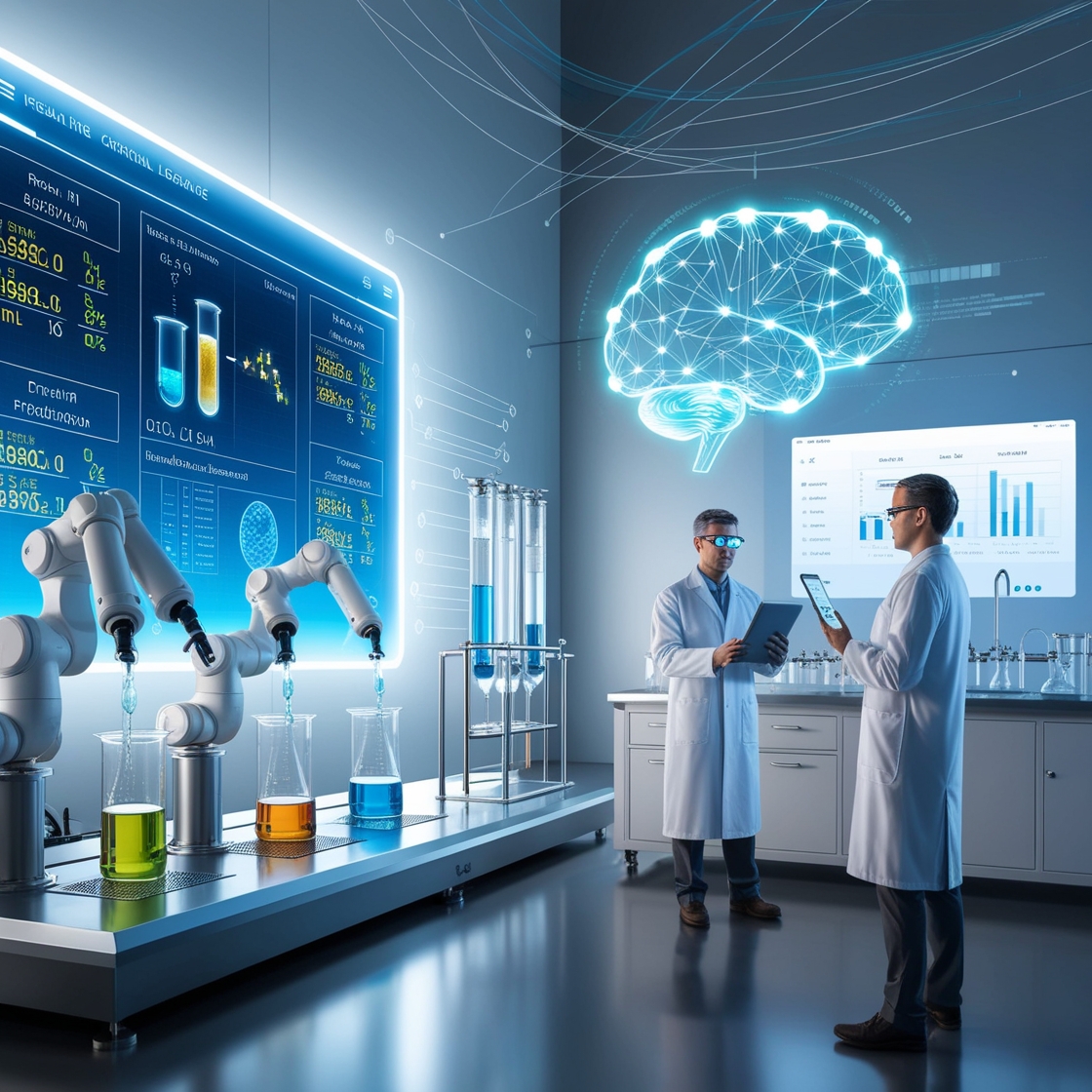Introduction
As seen by the advanced procedures that have supplanted conventional refining techniques and promoted innovation in petrochemicals, medications, specialty chemicals, and novel materials, the chemical industry has long been at the forefront of technical growth. Chemical compositions, manufacturing efficiency, and safety procedures have all improved over time, thanks in large part to industrial science and engineering. But as AI in the Chemical Industry and Data Analytics develop quickly, a new era of transformation is beginning—reshaping how chemical companies innovate, operate, and ensure safety.
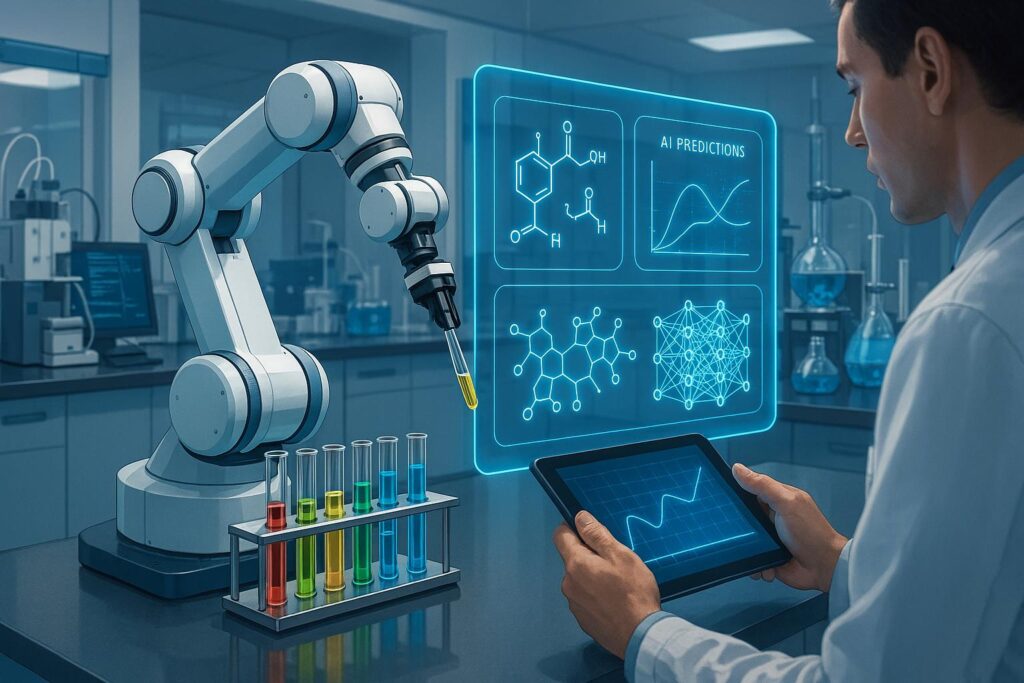
AI in the Chemical Industry is more than just a theoretical concept; it has become a disruptive force that drives improvements in cost-effectiveness, sustainability, and operational efficiency. By leveraging cutting-edge technologies like AI-driven chemical research, predictive analytics in chemical manufacturing, and machine learning in chemistry, businesses can increase worker safety, accelerate product development, minimize waste, and streamline complex chemical processes. Through powerful Data Analytics, AI in the Chemical Industry helps organizations tackle persistent challenges such as reducing operating costs and enhancing precision in chemical formulations and quality control, all by analyzing large datasets, recognizing patterns, and delivering real-time decision-making insights.
The industry today faces a growing list of global challenges, including resource scarcity, climate change, volatile raw material prices, and strict regulatory requirements. AI in the Chemical Industry provides AI-powered solutions that enable data-driven decision-making to reduce environmental impact while boosting productivity. What once was considered a tool for incremental improvement, Big Data in Chemical Engineering has now evolved into a strategic necessity for companies striving to stay ahead in a highly competitive market.
This article explores the powerful influence of AI in the Chemical Industry, highlighting its real-world applications across research and development (R&D), automation, quality assurance, and process optimization.
It also raises an important question that many companies still grapple with:
Can all chemical manufacturers truly adopt AI, or is it still limited to a privileged few?
The Role of AI in the Chemical Industry
Process Optimization with AI
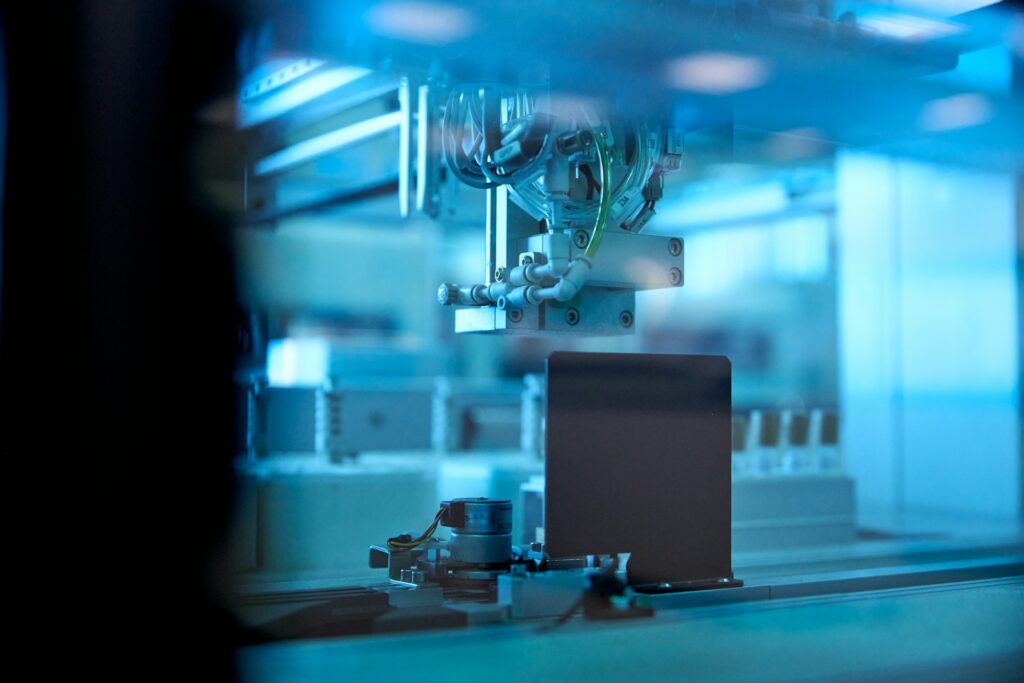
Chemical plants generate vast amounts of real-time data from their equipment, sensors, and production lines. AI-driven chemical Research uses this data to:
– Identify inefficiencies in manufacturing processes
– Reduce waste by predicting optimal reaction conditions
– Optimize energy usage, reducing overall costs
For example, Deep Learning in Chemistry allows for precise control over reaction variables, improving product quality while reducing raw material consumption.
Predictive Maintenance in Chemical Manufacturing

Chemical plants rely on complex machinery that is prone to wear and tear. Predictive Analytics in Chemical Manufacturing enables companies to:
– Detect anomalies in equipment behavior
– Schedule maintenance before failures occur
– Minimize downtime and increase operational efficiency
By integrating Industrial IoT in the Chemical Industry, companies can use AI to analyze sensor data and identify maintenance needs before costly breakdowns happen.
AI-Based Quality Control in Chemicals
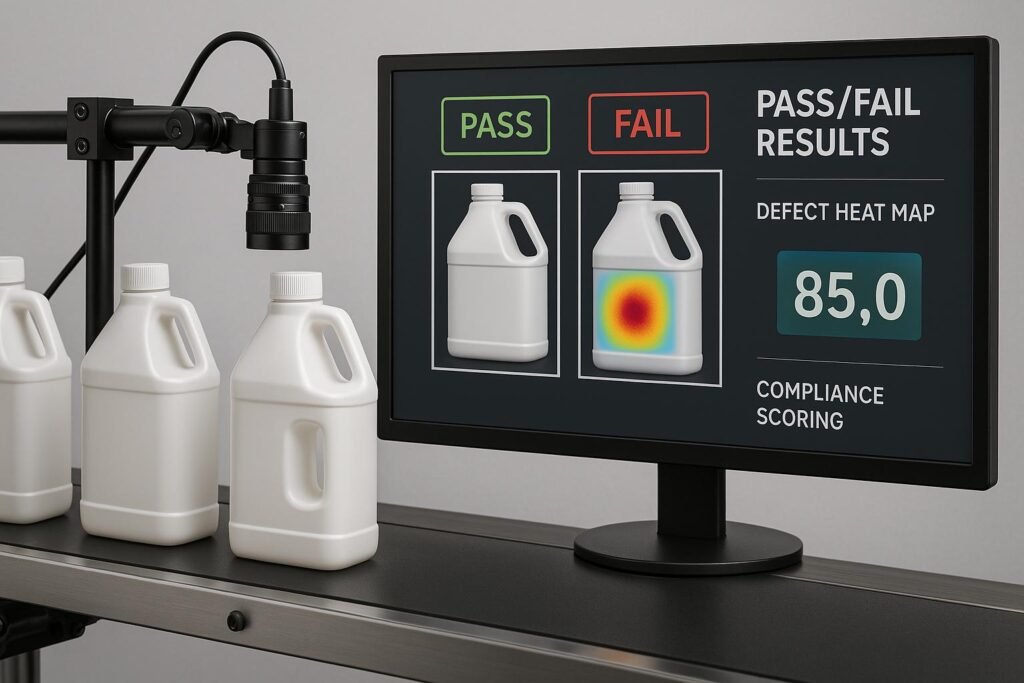
Ensuring chemical purity and consistency is critical in industries like pharmaceuticals, plastics, and petrochemicals. AI-enhanced chemical Formulation improves quality control by:
– Automating defect detection using computer vision
– Identifying inconsistencies in chemical compositions
– Reducing human error and improving compliance
With AI, companies can enhance chemical process simulation, leading to better control over final product specifications.
AI for Hazard Detection in Chemicals and Safety Compliance

The chemical industry deals with hazardous substances, and AI plays a crucial role in risk assessment and compliance with safety regulations. AI for Chemical Safety Compliance enables:
– Early detection of toxic gas leaks and spills
– Automated risk assessments based on historical data
– Compliance with environmental and safety regulations
By integrating Neural Networks for Chemical Data Analysis, companies can predict hazardous events and take preventive actions.
AI-Powered Material Science and Drug Discovery

AI is revolutionizing chemical research by accelerating material discovery and drug development. AI-powered material Science enables:
– Faster discovery of new chemical compounds
– AI-driven drug discovery for pharmaceutical advancements
– Efficient analysis of large datasets to uncover new formulations
With AI in the Petrochemical Industry, companies are also identifying sustainable alternatives to fossil-based materials, paving the way for a greener future.
Is AI Adoption in the Chemical Industry Truly Feasible for All Companies?
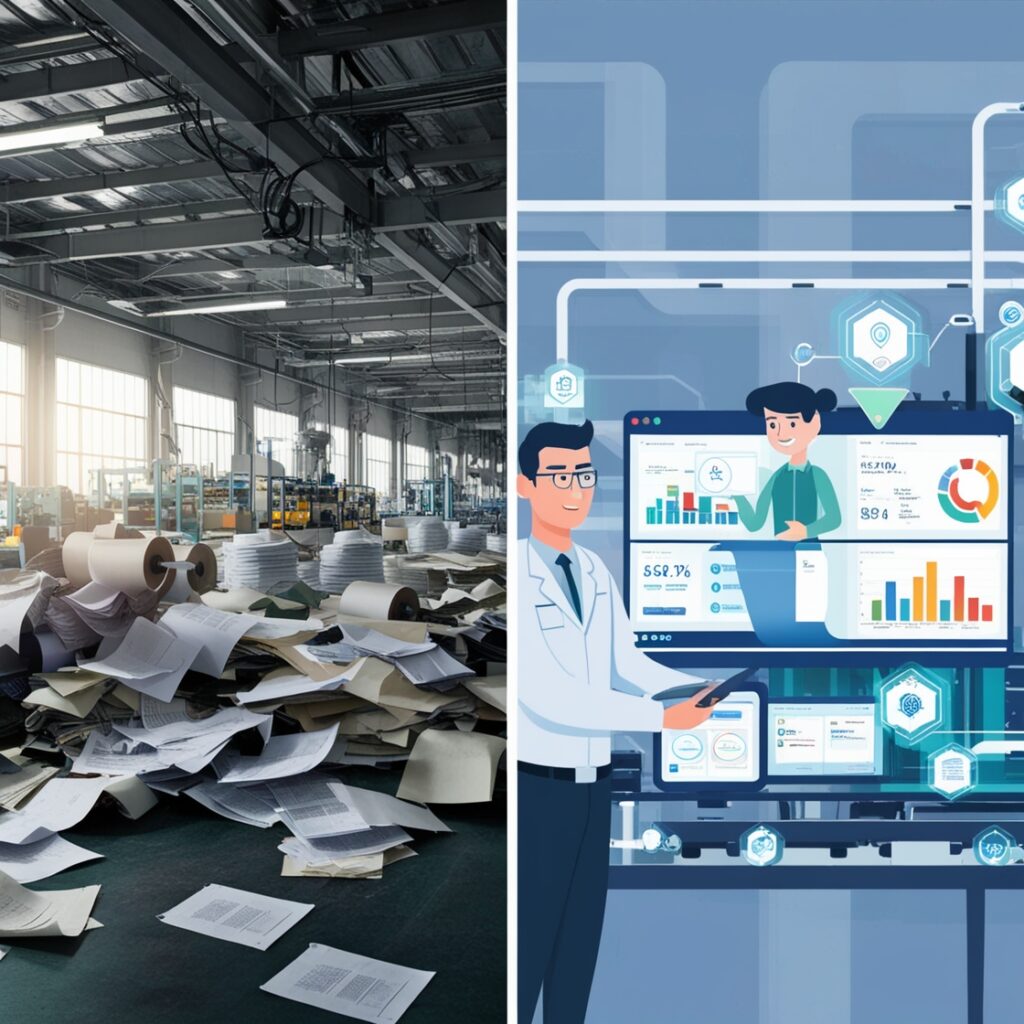
While the benefits of AI in the Chemical Industry are undeniable, many companies face challenges in AI adoption. Data Availability, High Initial Costs, and Workforce Readiness are significant concerns.
– Data Challenges: Many chemical companies operate legacy systems with fragmented data. Investing in Data Analytics platforms and Cloud Computing in Chemical Data Analysis can bridge this gap.
– Cost Concerns: AI implementation requires significant upfront investment, but Smart Chemical Manufacturing helps companies achieve long-term cost savings.
– Skill Gaps: Companies need skilled professionals such as Data Analysts and AI specialists to integrate these technologies. Workforce training and AI partnerships can help bridge the gap.
Despite these challenges, AI adoption is not a luxury but necessary for companies looking to stay ahead in the competitive landscape.
Conclusion
More than merely a technical advancement, the emergence of AI in the Chemical Industry represents a revolution that is changing how the industry functions. AI-driven technologies are producing noticeable gains in productivity, security, and environmental impact in a variety of fields, from process optimization and predictive maintenance to hazard detection and sustainability planning.
Despite its potential, this change is not without its difficulties. Many businesses must overcome obstacles, including data fragmentation, significant implementation costs, and the requirement for worker upskilling, to integrate AI. At this point, having a competent Data Analyst on staff becomes essential. As specialists in Data Analytics, Data Analysts assist in converting unprocessed data into useful insights, creating models to track performance, and identifying patterns that might direct strategic choices. Even the most sophisticated AI systems might not reach their full potential without this human layer of interpretation and experience.
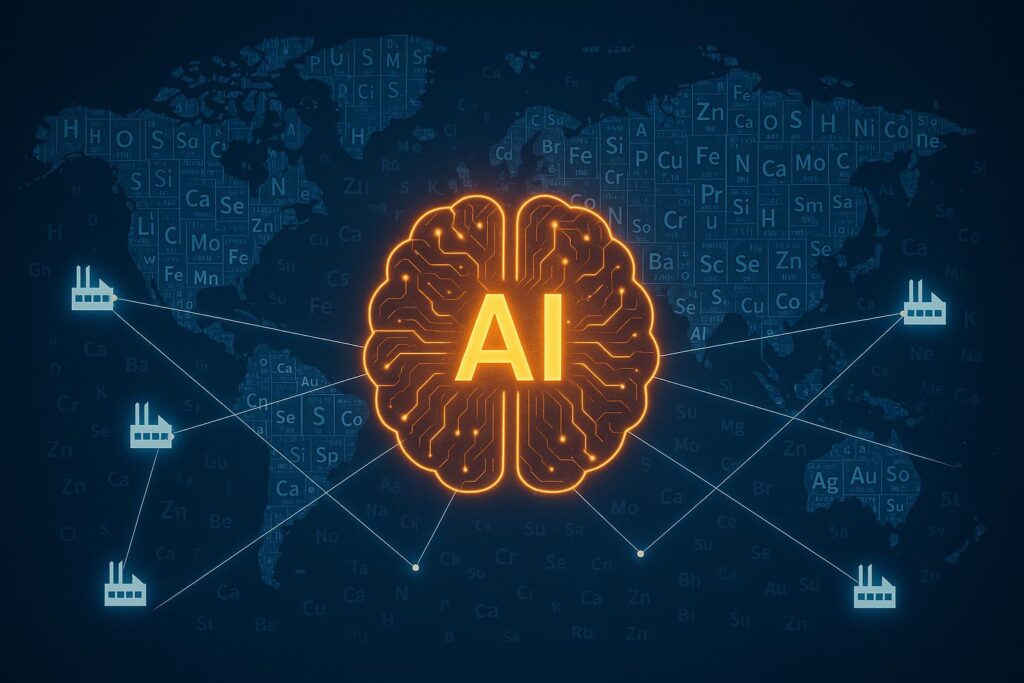
Businesses can seize significant chances for innovation, quality assurance, and more intelligent production by investing in AI-driven chemical research, implementing Big Data in Chemical Engineering, and assembling teams with skilled Data Analysts at their heart. In addition to resolving current issues, these capabilities pave the way for the creation of new products, improved supply chain resilience, and quicker time to market.
The chemical industry needs to take swift action to remain relevant as we move closer to a future in which AI and Data Analytics are crucial for all sectors. “Should we use AI?” has already been addressed; thus, the true question is no longer that. “How quickly can we implement it—and who will lead the way?” is the actual challenge at hand.
Therefore, consider this: Are you prepared to accept AI in the Chemical Industry?
Because the chemical industry of the future is intelligent, efficient, and data-driven, not just automated.

